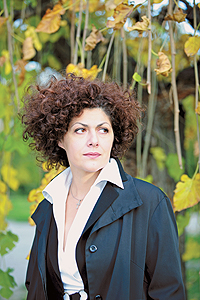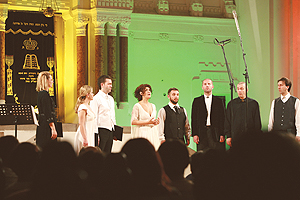Ars sacra
DIVNA LJUBOJEVIĆ AND HER ”MELODS” CHORUS, WITH ALL PARTS OF THE HOMELAND MOSAIC
Byzantium after Byzantium
This charismatic and beautiful Belgrade woman has been in the quire since she was ten. The ancient skill of original Byzantine singing, brought by the Russian nuns who emigrated after 1917, was handed over to her at the Monastery of Presentation in Senjak. She is the successor of the golden thread and today one of the most authentic (still not sufficiently utilized) Serbian cultural brands. With her singing, she pervades a whole cultural circle bordered by Greece, Russia, Serbia, Bulgaria, Romania, while the doors of the most prestigious world concert halls open to her. She is one of the good paths of Serbian culture in the new century
By: Kristina Ševo
 ”One cannot remain indifferent when hearing this singing.” ”This voice, like an angel voice, as the divine echo in a man, opens hearts, regardless of which culture they come from, which faith or ideology they belong to.” ”This is not a concert, this is exhaltation, a ceremony, ennobling the world and man on the path of their apotheosis. That is why it can be listened to in an ancient orthodox temple, here, in Delphi, in a concert hall in Moscow, Tokyo or New York. Everywhere it will be the same soul quake and ascension.” ”No one before her sang liturgy in such a way.” ”It is most beautiful when listened to with closed eyes.”
”One cannot remain indifferent when hearing this singing.” ”This voice, like an angel voice, as the divine echo in a man, opens hearts, regardless of which culture they come from, which faith or ideology they belong to.” ”This is not a concert, this is exhaltation, a ceremony, ennobling the world and man on the path of their apotheosis. That is why it can be listened to in an ancient orthodox temple, here, in Delphi, in a concert hall in Moscow, Tokyo or New York. Everywhere it will be the same soul quake and ascension.” ”No one before her sang liturgy in such a way.” ”It is most beautiful when listened to with closed eyes.”
That is what the world media, famous guests, invited unknown people said after the concerts of Divna Ljubojević and her ”Melods” chorus. Five of her CDs were extraordinarily successful on the Western European market (published by JADE – Milan Music – Warner Music). A big concert is announced at the Paris National Theater for March, whereas the first video DVD of Divna Ljubojević and the ”Melods” chorus named Mirror has just appeared on the Serbian market, including eight concerts, seven video clips, a documentary.
Divna Ljubojević, charismatic and elegant, beautiful and aristocratically quiet, is the most remarkable representative of old Byzantine-Russian signing in today’s culture, not only Serbian and not only Orthodox Christian, as well as one of the most authentic, most powerful brands of the Serbian culture and tradition on the planet.
She was born in Belgrade, in 1970, on the day of Annunciation. She tells National Review that she was brought up in a religious family and was introduced to church singing very early. She was ten years old when she perceived the beauty of the ancient Russian church singing in the Monastery of the Presentation of Holy Mother of God in her hometown, with the caring influence of prioress Agnia and her nuns.
– Since, civilization-wise, Russia was the true successor of the Byzantine Empire, its art has always been signified with that wide, divine spirit, which creates with ease and freely develops its rich heritage. In that sense, Russian church signing today is perhaps not similar to Byzantine as Romanian and Bulgarian are, but is equally magnificent and inspiring for me. Nuns from the Lesna Monastery, who emigrated from Russia after the October Revolution in 1917, brought that singing to the Monastery of Presentation, where I was introduced to it. It was freely merged with Serbian singing, as the second variety of Byzantine heritage. Therefore, Russian singing for me represents one of the most important foundations of my musical and performing growth – says Divna Ljubojević.
TEMPTATIONS OF THE BIG CITY
 After finishing elementary and middle music school in Belgrade, she enrolled at the Art Academy in Novi Sad and graduated from the Department of General Music Pedagogy, aware of the importance of handing over the gained knowledge and gifts to younger generations.
After finishing elementary and middle music school in Belgrade, she enrolled at the Art Academy in Novi Sad and graduated from the Department of General Music Pedagogy, aware of the importance of handing over the gained knowledge and gifts to younger generations.
– Besides my hometown of Belgrade and Novi Sad where I studied, I also carry within other faces of the grand and rich Serbia, equally important parts of the homeland mosaic. Outside of the ‘big city Serbia’, Belgrade and Novi Sad Serbia, there is a different Serbia in my life, smaller and more intimate, hidden, which ennobled me with the beauty of nature and dignity of people. The narrow, clear, fast and cold Rzav river essentially influenced my being more than the big and muddy Danube and Sava. My experience tells me that there are many dangers and numerous temptations in growing up in the urban landscapes of Belgrade and Novi Sad. There is laziness and tediousness, sterile melancholy, a specific non-creativity, terrible insensitiveness for beauty and happiness. That great water, sufficient to itself, which silently rolls, swallows the bank and the landscapes it passes through uninterested, does not give liveliness and life to the soul. It is sad and one cannot peak into it. One cannot drink from it, wash his face in it, or take out a fish with his bare hand. The outlets of sewer pipes which unload the dirt of the city into the water are often placed under the bridges of great rivers. Hence the city feeds the river with its filth, and the river responds with sorrow.
Besides being an exquisite singer, Divna Ljubojević expressed her talent for conducting very early. Already at the age of 16, she led the rehearsals of the Faculty of Theology choir and conducted the united Belgrade choirs at the first Easter liturgy at the Vračar temple, therefore becoming the youngest conductor in the history of the oldest Serbian singing society. With a wish to freely develop her authentic artistic expression, she founded a spiritual music choir and studio ”Melods” in 1991 with her friends and associates. Named after St. Roman the Melodist, one of the best church singers of all times, the choir consists of people sharing the same gift and love for traditional spiritual music, living and breathing together in liturgy. With the blessing of the then prioress Agnia, the Monastery of Presentation in Senjak, actually the birthplace of this choir, became its seat.
– My associates and friends with whom I sing, work and create are an integral part of my ”creative workshop”. With them I sing in concerts and liturgies, it is a living creative workshop with me as a part of it. There are also our listeners who have been faithfully following our work all these years.
REGAIN EARTH BENEATH THE FEET
Divna Ljubojević’s art is created in an organic and direct process, spontaneously, it originates from her real life. Long before the decision to deal with music professionally, before studying at the Academy of Music, before becoming a conductor, before ”Melods”, she attended liturgies and sang every Sunday.
– When I am asked to explain the process of creating my songs, I have the impression that I am attempting to explain the unexplainable. It does not take place in one moment, just like that, according to my personal wish and intention. My songs are created years before I choose and perform them at a concert, and then finally publish them on a CD. It seems as if they choose themselves, as if it cannot be any different. As if there is an invisible magnetic field everywhere around me, regularly collecting and organizing all the melodies and words I sing, all those undersongs, hymns, condacs and psalms… ”Melods” and I are living in that wondrous atmosphere of the millennium long Orthodox tradition of church and Byzantine heritage so close to me. It is an inexpressible honor and privilege.
She is considered an authentic living expression of the New Byzantine spirituality and beauty, successor of the medieval Byzantine Christian idea. Out of the five published albums of Divna Ljubojević and ”Melods”, three have the word Byzantium in their title. She says that she is passionately researching how the Serbian-Byzantine singing would be like today if historical circumstances had not prevented its further development.
– I feel excitement and pride for belonging to Byzantium by birth, for being able to continue it with my life and through my singing gift. Byzantium, naturally, exists today too. Wherever you turn, you will see its traces. In its original form, it lasted 1.123 years. It preserved the Greek-Roman culture in order to hand it over to the European nations after they become mature enough to receive it. Many of them have come to barbarically plunder its treasures without knowing that its real treasure is God. That is why it is not by chance that the western audience, without exception, experiences with closed eyes or tears the music I perform at concerts, seemingly unknown to them.
The Mirror projects, says Divna Ljubojević, signified the beginning of their even harder work on revealing the forgotten pearls of the Serbian music and spiritual tradition, on strengthening the Neo-Byzantine line of Serbian cultural heritage. Since, that is the light which can clearly point the true paths of the autonomous Serbian culture in the new age and regain earth beneath its feet.
***
Gift
– I have received a gift, and each God’s gift is independent. The love of God spreads onto people through gifts (talents). In all times, the attention of people should have been drawn to this unbreakable thread connecting them with God through faith, tradition and art. It is something much larger than me, I carry it within me, but it does not completely belong to me. That is why I do not feel the need to analyze the gift, to think about it, to rationalize it. I only accept it with gratitude.
***
Performances
During the seventeen years of its existence, ”Melods” and Divna Ljubojević held over 400 concerts all around the world. The critics regularly judge their performances as brilliant. At the Paschal Festival of Spiritual Music held recently in Moscow, ”Melods” were the only who had an encore.
Besides, Divna Ljubojević holds numerous lectures throughout Europe about the Byzantine heritage of spiritual music and her immediate artistic experience. She is also the founder of the ”St. Simeon the Myrovlyte” choir in the Church of St. Sava in Paris, where she often performs with the ”Melods”
***
Mirror
After numerous CDs published in Serbia and abroad, Divna Ljubojević and ”Melods” have recently published the Mirror, their first video DVD. It includes eight concerts, seven video clips, Aleksanadar S. Kostić’s documentary about their performance in Vienna in 2007. Two completely new videos (Aksion Estin and Angelski Sobor) were recorded in the intact nature of Carska Bara and the almost unreal surroundings of the deserted castle in Beočin (Director of Photography Nikola Popović). Dragoslav Bokan, art director of the project, reveals in the accompanying book In the Mirror the cultural and historical path of what could be called ”Byzantium after Byzantium”, all that has happened with the Byzantine idea of beautiful and the Byzantine cultural code during the 555 years since the fall of Constantinople.
